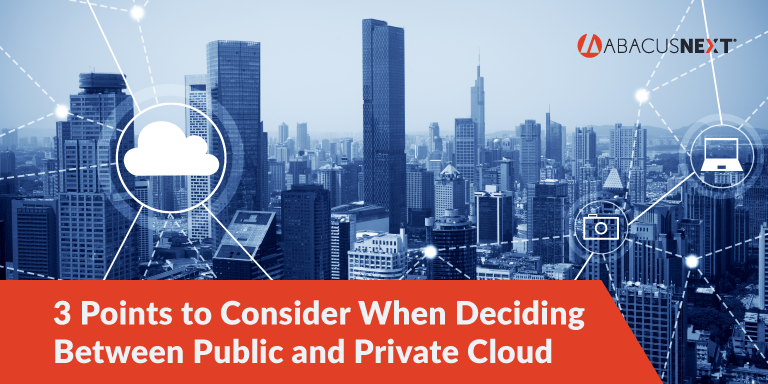3 Points to Consider When Deciding Between Public and Private Cloud


The demand for cloud computing in the accounting industry has risen dramatically in the past year, so much so that 58 percent of large companies use cloud computing and 67 percent of accountants think it makes their role easier. In fact, experts estimate that 83 percent of all enterprise business workloads will be in the cloud by 2020.
If you’ve been staying on top of technology trends, this shouldn’t surprise you. The benefits of cloud computing are significant, including increased flexibility, efficiency, and cost-savings. But even when you’re 100 percent on board with cloud computing, it can be difficult to determine whether your organization would benefit most from a public cloud or a private cloud.
Earlier this year, we tackled the basic differences between a public and private cloud. Now, we’ll look at the three steps you should take before making your final decision.
1. Understand what you’re buying
Before you make the decision between a public and a private cloud for your business, you should understand what you’re buying. When you set up a public cloud, you’re tapping into resources shared off-site with other companies; you can scale your usage up and down as needed. When you set up a private cloud, you’re getting a dedicated amount of on-site resources that are only available to your organization; you can build a permanent storage space for all of your proprietary client data.
2. Plan for the long-term
How you’ll use your data and how your business will grow over the next five-10 years will play an important role in whether your accounting firm should opt for a public or private cloud solution. For example, if you store years’ worth of client data in the cloud and also have plans to grow your business significantly over the next few years, it will likely be worth the extra cost associated with a private cloud to be able to maintain control over your data. If you tend to serve a high volume of clients and expect to maintain your current flow of business, the public cloud option might make more sense.
3. Consider your security and compliance needs
Finally, you’ll want to consider the security and compliance needs of your clients and client data. If your accounting firm handles data with Health Insurance Portability and Accountability Act (HIPAA), Sarbanes-Oxley Act (SOX) or Payment Card Industry Data Security Standard (PCI DSS) compliance requirements, you’ll want to have access to the extra security controls offered by a private cloud. If security and compliance aren’t top concerns, a public cloud might satisfy your requirements.
In some ways, the difference between public and private clouds is like the difference between a busy apartment complex and a detached, single-family home. Like an apartment complex, the public cloud allows you to access different community services as you need them and tends to be lower in cost. And like a detached, single-family home, the private cloud allows you to have complete control over your digital storage property and tends to be higher in cost. The best choice for you will depend on your budget and where your business is in its growth lifecycle.
At the end of the day, your goal is to serve your customers and grow your revenue. The best cloud option for your organization will be the one that facilitates growth and protects your long-term interests. To make the best decision for your organization, consult with a technology partner who understands your business needs and can guide you towards the best option for you.